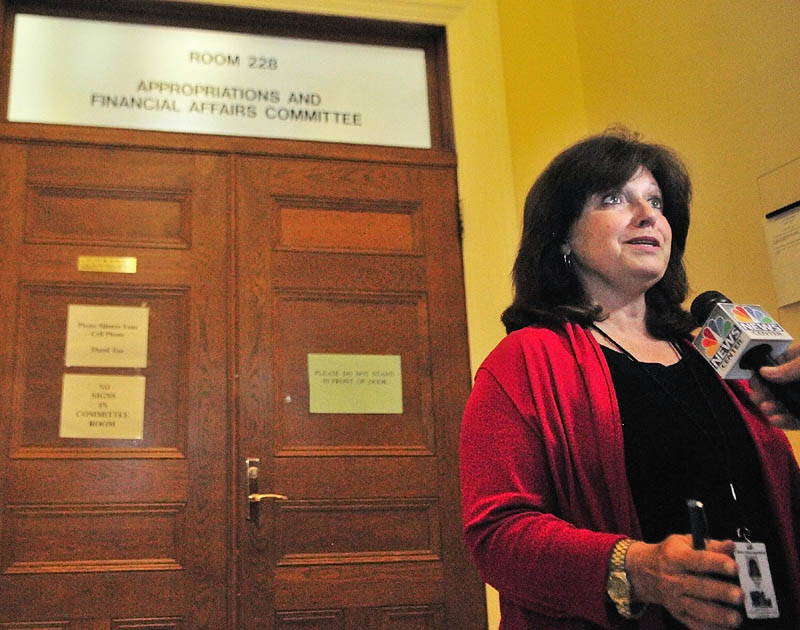AUGUSTA — Gov. Paul LePage said Friday that he plans to veto a $6.3 billion state budget that the Legislature’s budget-writing committee crafted during a long night of negotiations.
The spending package endorsed unanimously by the Appropriations Committee would raise Maine’s sales tax and meals-and-lodging tax temporarily, and it may well lead to an increase in property taxes in communities around the state.
The budget differs significantly from the one that LePage proposed in early January. That plan included no outright tax increases.
The committee’s unanimous support makes passage by two-thirds votes likely in the House and Senate. Those margins would be enough to override a veto.
The committee’s budget includes several temporary tax increases, including a 0.5 percent sales tax increase and a 1 percent hike in the meals-and-lodging tax.
Those increases would end when the next two-year budget ends, on June 30, 2015. They are designed to reduce the $200 million cut in municipal aid that LePage proposed to a $75 million cut.
The additional revenue also would restore money the governor proposed cutting for state services, including a drug program for the elderly. In addition, the committee’s plan includes a temporary restoration of longevity and merit pay for state workers, worth about $2.5 million over the two years.
LePage said in his weekly radio address that lawmakers failed to make difficult choices.
“That’s why I will veto any budget that raises your tax rates,” he said. “I don’t see it as politics. I see it as good public policy, and good public policy is good politics. I am not worried about the next election. I’m worried about the next generation.”
Legislative leaders weren’t surprised by LePage’s veto threat. Rep. Kenneth Fredette, R-Newport, the House minority leader, said the governor is consistent in opposing tax increases. His fellow Republicans share that view, Fredette said, but the Legislature is running out of time to pass a budget.
“It’s the reality of divided government,” he said, referring to Democrats’ majorities in the Legislature.
The governor’s threat does put pressure on the Republican caucus, which often splits between lawmakers who stay with LePage at every turn and those who are willing to break with him. While Republicans have helped sustain 11 vetoes this session, some key members have opposed him on major legislation. Fredette wouldn’t say where he will come down on the issue; but he noted that LePage’s budget contained a tax increase, in the form of an income tax indexing change that would have raised the tax bill of the average Mainer by $39 over the next two years.
The indexing, known as chained consumer price indexing, relied on subtle but substantive changes to the state’s income tax indexing and would have generated more than $8.6 million in income tax collections over the two fiscal years beginning July 1.
The Appropriations Committee rejected the proposal.
On Friday, Adrienne Bennett, LePage’s spokeswoman, forwarded a letter that the governor’s chief of staff, John McGough, had sent to state employees, indicating that the governor will review the committee’s budget thoroughly.
The governor will have 10 days to veto the budget or let it take effect without his signature.
Lawmakers hope the committee’s budget agreement will stave off a government shutdown, a prospect that has loomed over an often-contentious legislative session.
LePage said Friday that if a shutdown occurred, it would be the fault of Democratic leaders — House Speaker Mark Eves of North Berwick and Senate President Justin Alfond of Portland.
“I do not want to shut down government,” LePage said. “A shutdown is an act of failure. It is a failure to do the right thing for hard-working Maine families, but it is not up to me.”
LePage’s resistance centers on the temporary tax increases.
The committee’s proposal would move Maine’s sales tax from 5 percent to 5.5 percent and raise the meals-and-lodging tax from 7 percent to 8 percent, raising $178 million in revenue over the two-year period, said Sen. Patrick Flood, R-Winthrop, a committee member.
Much of the revenue would be used to fund at least partial restoration of some of the more unpopular cuts in LePage’s proposed budget, including the elimination of revenue sharing to cities and towns to save more than $200 million over the two years.
The committee’s proposed budget would restore $125 million in revenue sharing, with a $29 million property-tax fairness credit replacing Maine’s current Circuit-Breaker Program, said Jodi Quintero, a spokeswoman for Eves.
The budget also would restore $9.1 million to Maine’s homestead property-tax exemption. That money was to be eliminated in LePage’s budget, limiting the program to Mainers older than 65 and raising the exemption from the first $10,000 of property value to the first $20,000.
The cut in municipal aid is not as deep as LePage proposed, but the Maine Municipal Association, representing the state’s towns and cities, said it will still hurt.
“The overall municipal reaction is one of discouragement,” said Geoff Herman, the lobbyist for the association. “I don’t think the municipal people really understand why they deserve this … pullback in financial assistance for the services they provide that in many cases benefit state government.”
Municipal officials have said that cities and towns will be forced to raise property taxes if they lose revenue sharing money — or face the prospect of cutting vital local services. But LePage and some Republicans say property taxes have risen too much and towns should look for ways to consolidate their services. Quintero said that, in total, the proposed budget would restore $33 million to kindergarten-through-grade 12 education. Notably, committee members decided to accept LePage’s plan to shift a portion of teachers’ retirement costs from the state to school districts, but not immediately.
The governor’s proposed change would shift nearly $29 million of the state’s $201 million in teacher retirement obligations to districts, supported primarily by property taxes. Half of LePage’s proposed shift would be offset with a $14.5 million increase in general-purpose aid to schools.
The committee decided to fund the other half for the two-year period.
“You cannot demand all or nothing if you want to get something done,” said Rep. Peggy Rotundo, D-Lewiston, the committee’s House chairwoman, in a statement Friday morning. “This is a budget that restores massive cuts to our towns, schools, and to funds that help our elderly and disabled get the care they need.”
The budget also attempts to increase funding that would allow about 3,100 severely disabled Mainers who are eligible for Medicaid to be moved off a waiting list. The waiting list has been mentioned frequently during the ongoing debate about expanding Medicaid through the Affordable Care Act. Rep. Kathleen Chase, R-Wells, said Republicans didn’t come easily to the decision to raise some taxes temporarily. Earlier this week, Chase indicated that Republicans were not prepared to accept any revenue increases. That position changed after Democrats backed off their initial proposal to delay implementation of $400 million in tax cuts passed by the Legislature in 2011, but not offset by any other changes.
LePage’s budget proposal was designed to protect the tax cuts, and Republicans vowed to defend that effort. The cuts take effect July 1.
Some Republicans said this week that the state should cut more services to avoid raising any taxes. Chase, however, said there weren’t many options left that were acceptable to either party.
“This was a very tough budget for all of us,” she said, adding that the economic recovery was slow to reach Maine.
Sen. Dawn Hill, D-York, said the budget was an uphill battle.
“We checked our politics at the door and came up with a solution that we can all live with,” she said. “Our bipartisan solution is responsible and it prevents a massive property tax increase for all Mainers. It keeps government running and gives peace of mind to Maine people.”
Steve Mistler — 620-7016
smistler@pressherald.com
Twitter: @stevemistler
Michael Shepherd — 370-7652
mshepherd@mainetoday.com
Twitter: @mikeshepherdme
Send questions/comments to the editors.




Comments are no longer available on this story